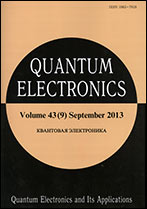|
This article is cited in 1 scientific paper (total in 1 paper)
Brief Communications
Influence of collisions on the saturation of a Doppler line profile
V. A. Alekseev, A. V. Malyugin
Abstract:
An analysis is made of the influence of the changes in the velocity of atoms in collisions on the saturation of a Doppler line profile. It is shown that when the homogeneous line width is sufficiently small the saturation effect cannot be described by Bloch-type phenomenological relaxation constants.
Received: 28.04.1977
Citation:
V. A. Alekseev, A. V. Malyugin, “Influence of collisions on the saturation of a Doppler line profile”, Kvantovaya Elektronika, 4:11 (1977), 2472–2475 [Sov J Quantum Electron, 7:11 (1977), 1416–1418]
Linking options:
https://www.mathnet.ru/eng/qe8253 https://www.mathnet.ru/eng/qe/v4/i11/p2472
|


|





 Contact us:
Contact us: Terms of Use
Terms of Use
 Registration to the website
Registration to the website Logotypes
Logotypes









